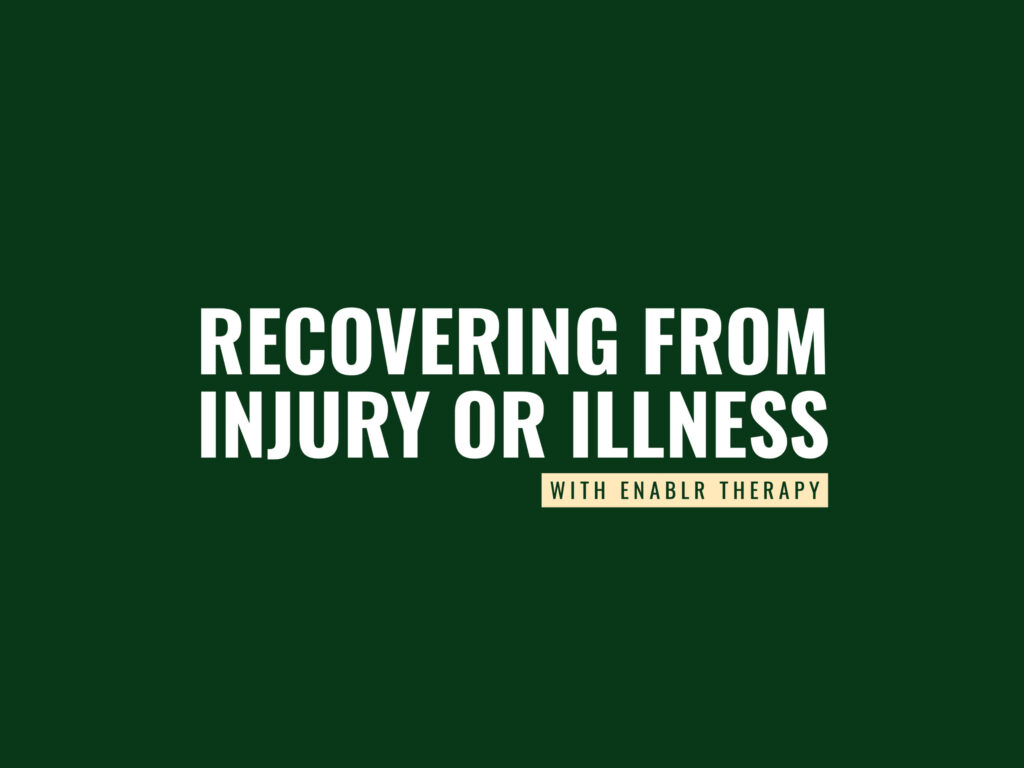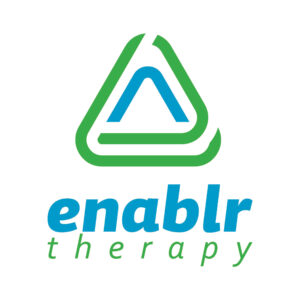
Healing and recovery is a multifaceted process that requires an individual to become mindful of physical and mental health to maximize progress. At Enablr Therapy, our years of experience in physical rehabilitation have highlighted the key components to recovery.
Components to Recovery
Nutrition
Nutrition can have a major impact on overall healing and wellbeing. After an extended illness or injury, it is important to eat regular, well-balanced meals to keep energy levels up for therapy and activities, as well as provide nutrients needed for healing. Stay hydrated to allow your body to promote blood flow to your cells for healing and to remove waste. Ask your doctor about supplements or dietary considerations for your particular condition.
Sleep
Sleep provides time for the body to rest, repair, and heal. However, when recovering from an injury or illness, some people experience decreased sleep quality. For instance, pain can interfere with the quality and length of sleep. Start a log to track your sleep and note possible issues that are interfering. The sleep log can help you find a solution by identifying patterns and pinpointing the problem. Share concerns about pain and sleep with your doctor.
Mindset
Developing a mindset to stay focused on what you want will help you continue to move forward even when it is difficult. You can develop this mindset by setting reasonable goals that keep you moving forward and by asking others to hold you accountable. Look for “positives” whenever possible to reframe your thoughts and perspectives. Many have found that prayer, medication, reflection, and visualization can help reduce stress and develop this positive outlook.
Celebrate
Celebrate your daily wins, the little victories for the thing that you can do today that you couldn’t do yesterday, or the day before, or last week. Remember, recovery sometimes has ups and downs, high days and low days, days of moving forward and some days that seem to move backward. Look at your overall progress and celebrate. Reward yourself with special activities and treats and invite those around you to celebrate with you.
It is OK to have some rough days- recovery can be hard.
- You may be grieving for what you were able to do before but now have problems doing.
- You may be in more physical pain.
- You may be anxious about what the future brings.
Being aware of your feelings and naming them can help you manage them and your overall health. If anxiety or depression are interfering with your ability to do everyday activities or to actively engage in your recovery, talk with your doctor.
Activity
Although rest is important in recovery, activity is equally important. Activity and exercise increase blood flow, improve strength, endurance and movement, and boost mental functioning-to name a few benefits. Participating in activities can give you a sense of independence and purpose, as well as a very practical way to measure your progress. Additionally, being more active allows you to interact with others to give and receive support. Our therapists can work with you to develop a program to increase your activity levels safely. This program will gradually increase your physical abilities and look for ways to adapt those activities to make them more difficult.
Next Steps
Finding the services and support you need to recover is important. Here at Enablr Therapy, we are ready to help. Our talented and experienced pool of licensed therapists can help to address a wide range of needs. From strength, balance, movement to participation in daily activities, communication, and so much more! Whether you need work on physical aspects or functional cognition, we have your rehabilitation needs covered.

Walking and Mobility
Pain Management
Fall Prevention
Personalized Fitness

Communication
Eating and Swallowing
Voice Quality
Functional Cognition

Activities of Daily Living
Home Safety Evaluations
Hand and Arm Use
Functional Cognition and Vision
To learn more how Enablr Therapy partners with you, visit our therapy services page.
Written by Rachel Morris, OTR/L, Director of Therapy



